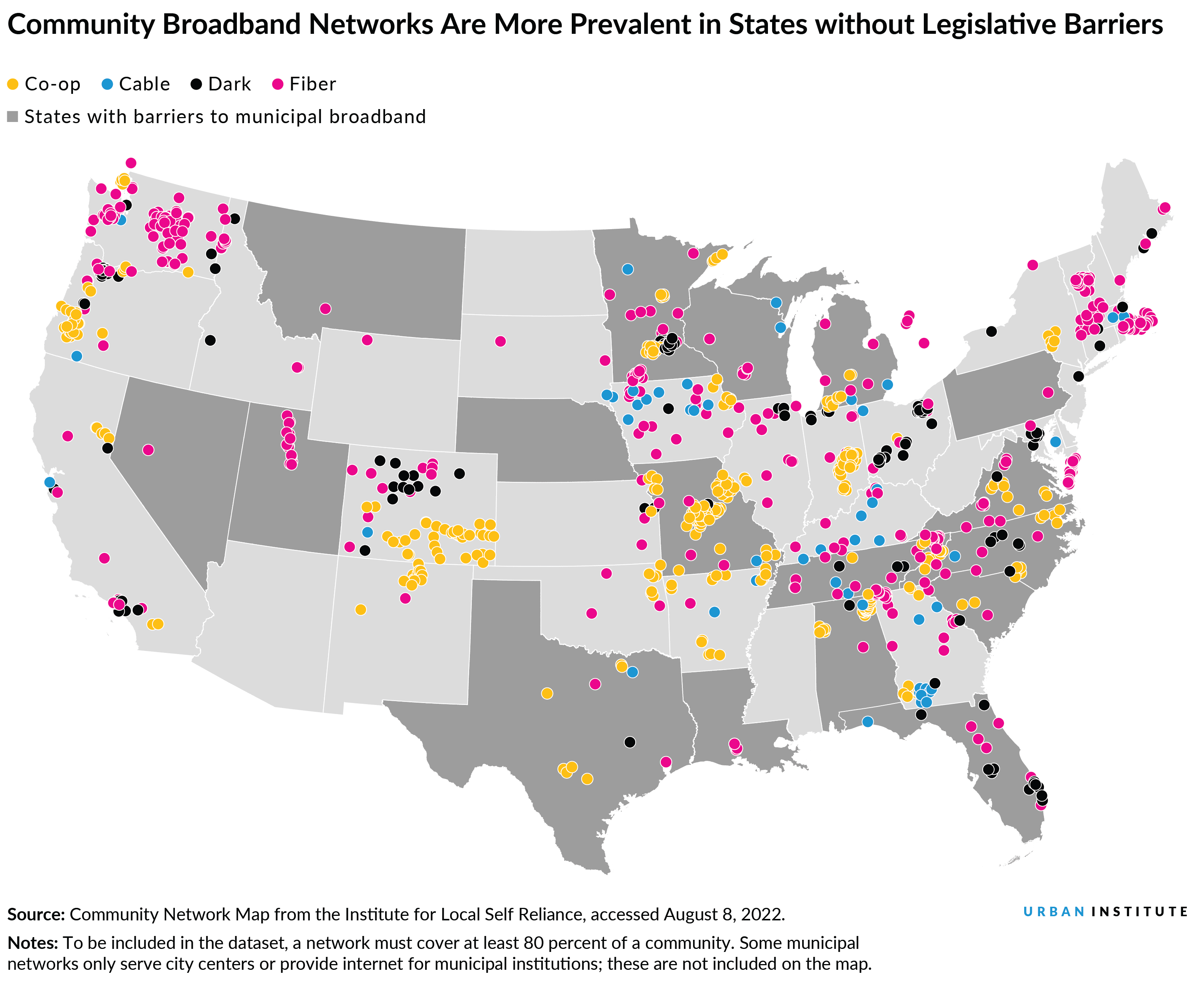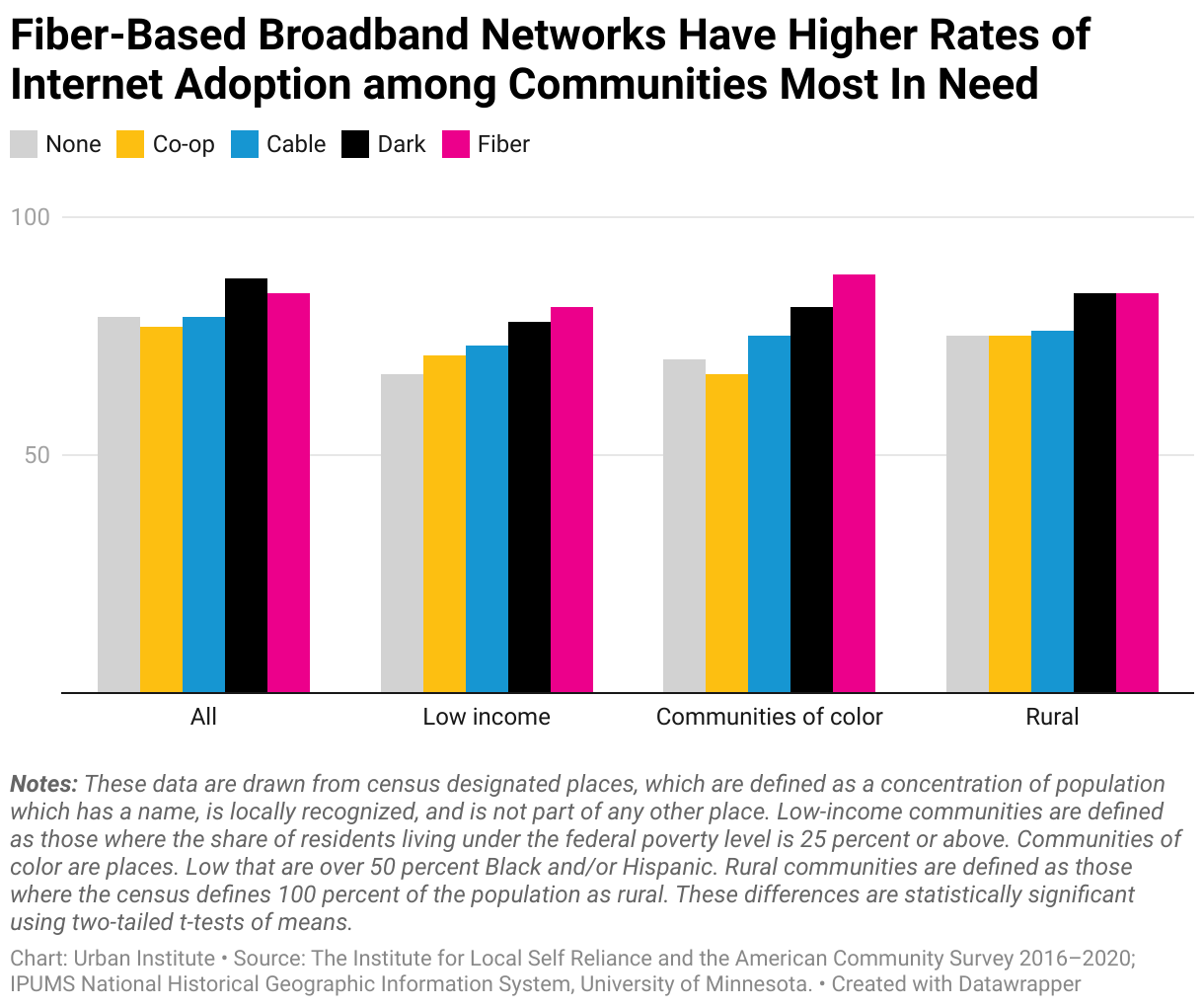Could Investments in Community Broadband Bridge the Digital Divide?

Fly View Productions via Getty Images

Connecting state and local government leaders
COMMENTARY | These locally owned and operated broadband networks can bring down prices, expand coverage and increase competition.
This story was first published by the Urban Institute. Click here to read the original version.
Today, approximately 19 million Americans lack broadband access. Even for those with internet, fast upload and download speeds are often prohibitively expensive. In the United States, broadband costs are almost double those of similar countries.
About 100 million Americans, predominantly people with low incomes and people of color, remain unconnected to high-speed, broadband internet, creating a digital divide. Only 71% of Black adults and 65% of Hispanic adults have a broadband connection at home, compared with 80% of white adults.
Market failures are to blame for the high price of broadband. According to a 2017 study, 70% of Americans have only one or no option for broadband, often because of the high costs to establish such networks. Internet service providers (ISPs) have few incentives to lower prices without competition—and tend to raise prices instead.
One solution to bring down prices, expand coverage and increase competition is community broadband: internet infrastructure owned and, in some cases, operated by a local government or a collection of citizens. For areas lacking affordable internet access, community broadband can be a powerful tool to diminish the digital divide.
What is Community Broadband?
In 17 states, legislative barriers, which were lobbied for by private ISPs, prevent cities from choosing to invest in municipal broadband, either by banning municipal networks or imposing financial or legal roadblocks. But as of 2022, more than 900 U.S. communities have adopted some form of community broadband, including more than 600 served by a municipal network and hundreds more served by an electric cooperative.
Common models of community broadband include the following:
- Fiber: The most popular model of citywide broadband is publicly owned fiber, which uses fiberoptic cables. This type of municipal broadband is similar to private ISPs, providing services directly to the public.
- Dark fiber: Municipalities build and maintain the physical infrastructure of a fiber network but don’t provide the internet themselves. Instead, cities lease out the infrastructure to ISPs, reducing market entry costs for new providers. Dark fiber is one of the least expensive municipal broadband investments, as cables can be laid in tandem with other capital projects.
- Cable: These broadband networks are an older, and somewhat slower, generation of internet provision, using the same infrastructure as cable television. Community cable allows the city to act as an ISP.
- Co-op: Co-ops are rural electric cooperatives that can be used to support retail broadband. These networks are collectively owned and operated by subscribers. Co-ops are designed to focus on service instead of profit, which makes them invaluable in reaching the most rural areas of the country.
Such community broadband networks are found coast-to-coast, but they are less common in states where legislatures have enacted barriers to their establishment.

Community fiber networks almost always offer lower prices than private ISPs and are more consistent in their pricing than private services. In Ammon, Idaho, one of the most affordable US broadband markets, city residents can access high-speed gigabit connections through a municipal lit fiber (PDF) system for as little as $9.99 per month. Residents pay for access to the network, then they can choose which ISP to connect to. The city wanted to encourage competition between private providers that could lease the infrastructure and “eliminate anti-competitive pricing schemes.”
Municipal networks also offer fast internet speeds. Of the 10 fastest US ISPs, nine use community networks or have municipal ISPs. Chattanooga, Tennessee’s EPB Fiber is one of these municipal services, ranked seventh-fastest nationwide. In 2010, Chattanooga became the first US city to build fiber-to-the-home services, offering one gigabyte upload and download speeds. Although it cost $220 million to build, the network has seen a $2.69 billion return on investment since 2010, creating jobs and bridging the digital divide for underserved areas.
Community Broadband May Lead to Increased Internet Adoption
According to national broadband and census data, places with municipal broadband networks have higher internet subscription rates on average.
Communities with fiber and dark fiber networks have higher rates of internet access. These communities have an average internet adoption rate of 85.8% compared with a 79.2% rate in communities without municipal broadband. For majority Black and Hispanic communities, fiber-based networks demonstrate higher average internet adoption rates by 14 percentage points. Fiber-based networks are also associated with higher internet use in rural places and cities and towns with high levels of poverty.

On average, having a fiber network is associated with a 1.5 percentage point higher rate of internet adoption. Although this effect feels like a small change, these findings suggest these services result in better internet access and faster, cheaper services for communities most in need.
These data suggest a connection between internet subscription rates and municipal broadband, but more concrete data and tracking over time is needed for verification. Also, these estimates are likely conservative, as community broadband at this scale is a recent phenomenon, with the number of networks jumping from around 100 in 2018 to more than 560 in 2020. Other unmeasured factors could also make high internet subscription rates and municipal broadband more likely.
Investment in Community Broadband Could Help Bridge the Digital Divide
In November 2021, President Biden signed the Infrastructure Investment and Jobs Act into law, which included $62 billion for broadband infrastructure. Of that allotment, $42.5 billion was earmarked for the Broadband Equity, Access, and Deployment Program, which is designated specifically for communities currently without a broadband-speed ISP. Although these funds are a strong step toward increasing internet infrastructure, conditions on the funding exclude most potential investments in community broadband.
Many places that could benefit already have a broadband-speed ISP and state laws functionally prohibiting municipal broadband. The federal government could consider funding municipal broadband infrastructure in places that already have access to broadband. Municipal networks can improve equity and access by increasing competition between ISPs in a monopolized market. And Congress could preempt state laws prohibiting municipal broadband, or states could remove these barriers on their own.
Although policy encouraging community-owned-and-operated networks doesn’t provide a total solution to closing the digital divide, municipal broadband—especially fiber-based networks—can bring down prices for high-quality internet and increase adoption rates in underserved communities.

NEXT STORY: Broadband gains still leave some behind, report says


